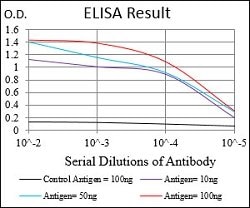missing translation for 'onlineSavingsMsg'
Learn More
Learn More
PRKACA Mouse anti-Human, Clone:7H3A4, Abnova™
Mouse monoclonal antibody raised against recombinant human PRKACA.
Supplier: Abnova Corporation MAB16593
Description
cAMP is a signaling molecule important for a variety of cellular functions. cAMP exerts its effects by activating the cAMP-dependent protein kinase, which transduces the signal through phosphorylation of different target proteins. The inactive kinase holoenzyme is a tetramer composed of two regulatory and two catalytic subunits. cAMP causes the dissociation of the inactive holoenzyme into a dimer of regulatory subunits bound to four cAMP and two free monomeric catalytic subunits. Four different regulatory subunits and three catalytic subunits have been identified in humans. The protein encoded by this gene is a member of the Ser/Thr protein kinase family and is a catalytic subunit of cAMP-dependent protein kinase. Alternatively spliced transcript variants encoding distinct isoforms have been observed. [provided by RefSeq]Specifications
| PRKACA | |
| Monoclonal | |
| Unconjugated | |
| ELISA (1:10000) Western Blot (1:500-1:2000) The optimal working dilution should be determined by the end user. |
|
| PRKACA | |
| Mouse | |
| 100 μg | |
| Human | |
| Antibody | |
| IgG1 |
| ELISA, Western Blot | |
| 7H3A4 | |
| protein kinase, cAMP-dependent, catalytic, alpha | |
| In PBS (0.05% sodium azide) | |
| MGC102831, MGC48865, PKACA | |
| Recombinant protein corresponding to amino acid 1-120 of human PRKACA from E. coli. | |
| 5566 | |
| Store at 4°C. For long term storage store at -20°C. Aliquot to avoid repeated freezing and thawing. |
|
| Liquid |
